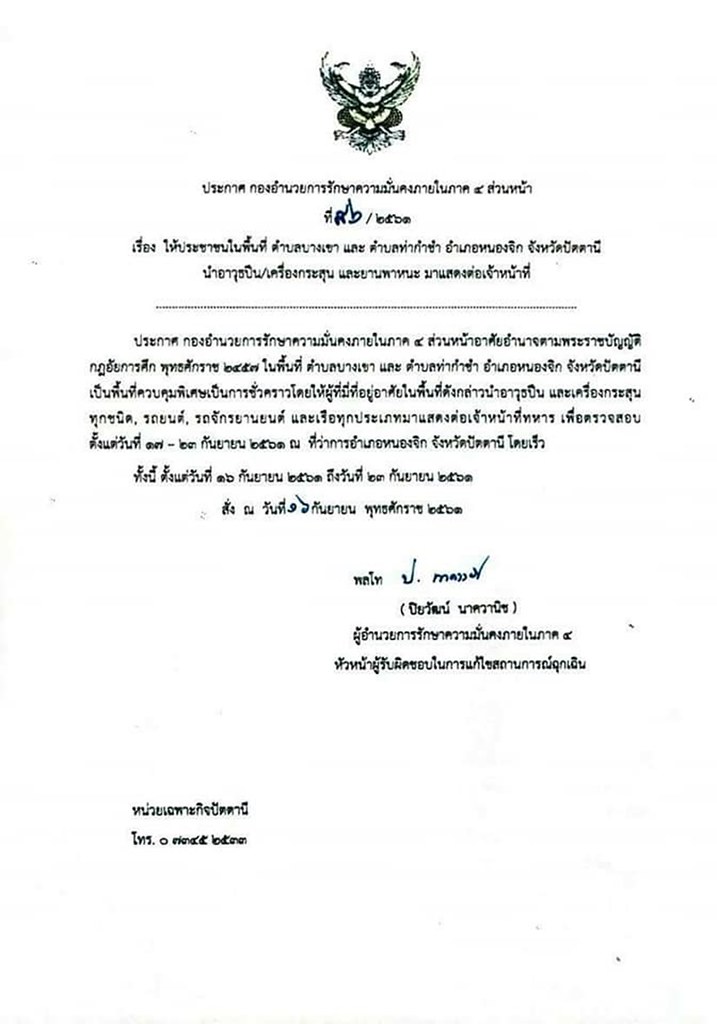Poonsuk Poonsukchareon, a human rights lawyer, made 5 observations on the authority of the agency which made the announcement, the inconsistency in the enforcement of laws in the locality and the principle of proportionality in ISOC Region 4’s declaration of Bang Khao and Tha Kamcham Subdistricts, Nong Chik District, Pattani Province as a temporary special control zone.
2 rangers were killed and 4 others injured in an ambush while returning to their base in Nong Chik District, Pattani Province on 11 September. Later, on 16 September, Lt. Gen. Piyawat Nakvanich, 4th Army Commander and Director of ISOC Region 4, held a press conference at the 46th Military Circle. ISOC Region 4 Forward Command Announcement No. 86/2018 declared Ban Khao and Tha Kamcham Subdistricts, Nong Chik District, Pattani Province, as a temporary special control zone, under the authority of the 1914 Martial Law. All residents in the area were to bring all guns, bullets, cars, motorcycles and boats to the military for examination from 17 – 23 September 2018 at the Nong Chik District Office.

The announcement made by ISOC Region 4 Forward Command, declaring Bang Khao and Tha Kamcham Subdistricts as special control zones
On 20 September 18, Poonsuk Poonsukchareon, a human rights lawyer, made 5 observations on the ISOC Announcement.
- This announcement is not an announcement using martial law. The truth is that the area had already been declared as an area under the martial law before this announcement was made. The announcement declared the area a special control zone from 16 September – 23 September and when the specified time has passed the announcement will cease to be in effect, but the area will remain under martial law.
- Internal Security Operations Command Region 4 Forward Command’s Announcement No. 86/2018 signed by Lt. Gen. Piyawat Nakvanich as the Director of Internal Security Operations Command Region 4, the person responsible for finding solutions in emergencies, contains an interesting point. The position of ISOC Regional Director, whose authority is established under the 2008 Internal Security Act, has no relation to the authority provided by the 1914 Martial Law Act. The announcement reflects an inconsistency of law enforcement in the area which has up to 3 laws related to security in effect, so that even those in charge themselves lack an understanding of their own roles and authority.
- “Special control zones” are not specified in the 1914 Martial Law Act, thus it is not a legal term. When the “special control zone” has not been determined, it would have no legal effect. Nevertheless, the announcement should be examined as to whether the military has the authority to enforce this power or not.
- According to Articles 8 and 9 of the 1914 Martial Law, military officials are given the authority to carry out a search but the search must only be for things that will be requisitioned, are prohibited, are to be seized or billeted in or are illegally possessed. Ordering persons to act for the sake of an aimless search with the purpose of punishing the guilty may therefore not fall within this criterion.
- Even though the violence from the ambush led to the deaths of 2 military personnel and injuries to 4 others, the measure of requiring all residents in the 2 subdistricts to bring in all their guns, bullets, cars, motorcycles or boats for the authorities to examine has affected and created fear among many people not related to the violence. This measure may go against the principle of proportionality since it affects the rights and freedoms of the people more than appropriate, which contravenes Article 26 of the 2017 constitution.
“The issue of violence in the southern border provinces is complicated and has multiple dimensions. The use of authority under security laws began in 2004 when martial law was enforced, followed by the Emergency Decree on Public Administration in a State of Emergency in 2005 and the Internal Security Act in 2008. In this area, apart from having no results and seeing no end to the problem, it is in fact found that the judicial process and law enforcement has had an effect on people and further complicated the solution to the problem. Only a judicial process that respects the right to fair trial and the principle of the rule of law will be one of the paths leading to peace,” Poonsuk concluded.

